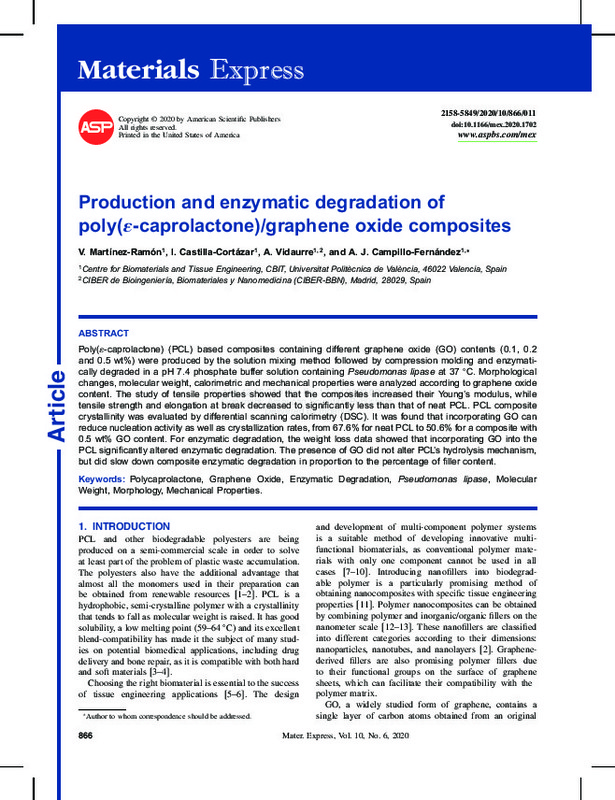JavaScript is disabled for your browser. Some features of this site may not work without it.
Buscar en RiuNet
Listar
Mi cuenta
Estadísticas
Ayuda RiuNet
Admin. UPV
Production and enzymatic degradation of poly (epsilon-caprolactone)/graphene oxide composites
Mostrar el registro sencillo del ítem
Ficheros en el ítem
| dc.contributor.author | Martínez-Ramón, V.
|
es_ES |
| dc.contributor.author | Castilla Cortázar, María Isabel Cecilia
|
es_ES |
| dc.contributor.author | Vidaurre, Ana
|
es_ES |
| dc.contributor.author | CAMPILLO FERNANDEZ, ALBERTO JOSE
|
es_ES |
| dc.date.accessioned | 2021-09-09T03:33:39Z | |
| dc.date.available | 2021-09-09T03:33:39Z | |
| dc.date.issued | 2020-06 | es_ES |
| dc.identifier.issn | 2158-5849 | es_ES |
| dc.identifier.uri | http://hdl.handle.net/10251/171675 | |
| dc.description.abstract | [EN] Poly(epsilon-caprolactone) (PCL) based composites containing different graphene oxide (GO) contents (0.1, 0.2 and 0.5 wt%) were produced by the solution mixing method followed by compression molding and enzymatically degraded in a pH 7.4 phosphate buffer solution containing Pseudomonas lipase at 37 degrees C. Morphological changes, molecular weight, calorimetric and mechanical properties were analyzed according to graphene oxide content. The study of tensile properties showed that the composites increased their Young's modulus, while tensile strength and elongation at break decreased to significantly less than that of neat PCL. PCL composite crystallinity was evaluated by differential scanning calorimetry (DSC). It was found that incorporating GO can reduce nucleation activity as well as crystallization rates, from 67.6% for neat PCL to 50.6% for a composite with 0.5 wt% GO content. For enzymatic degradation, the weight loss data showed that incorporating GO into the PCL significantly altered enzymatic degradation. The presence of GO did not alter PCL's hydrolysis mechanism, but did slow down composite enzymatic degradation in proportion to the percentage of filler content. | es_ES |
| dc.description.sponsorship | I. Castilla-Cortazar and A. J. Campillo-Fernandez are grateful for the support of the Spanish Ministry of Science, Innovation and Universities, through RTE2018-095872-13-C22/ERDF. A. Vidaurre would like to express her gratitude for the support of the Spanish Ministry of Science and Education, through the MAT2016-76039-C4-1-R Project, and also the support from CIBER-BBN, an initiative funded by the Sixth National R&D&i Plan 2008-2011, Iniciativa Ingenio 2010, Consolider Program, CIBER Actions financed by the Institute de Salud Carlos III with assistance from the European Regional Development Fund. The FESEM, TEM and mechanical tests were conducted by the authors at the Microscopy Service of the Universitat Politecnica de Valencia, whose advice is greatly appreciated, | es_ES |
| dc.language | Inglés | es_ES |
| dc.publisher | American Scientific Publishers | es_ES |
| dc.relation.ispartof | Materials Express | es_ES |
| dc.rights | Reserva de todos los derechos | es_ES |
| dc.subject | Polycaprolactone | es_ES |
| dc.subject | Graphene oxide | es_ES |
| dc.subject | Enzymatic degradation | es_ES |
| dc.subject | Pseudomonas lipase | es_ES |
| dc.subject | Molecular weight | es_ES |
| dc.subject | Morphology | es_ES |
| dc.subject | Mechanical properties | es_ES |
| dc.subject.classification | MAQUINAS Y MOTORES TERMICOS | es_ES |
| dc.subject.classification | FISICA APLICADA | es_ES |
| dc.title | Production and enzymatic degradation of poly (epsilon-caprolactone)/graphene oxide composites | es_ES |
| dc.type | Artículo | es_ES |
| dc.identifier.doi | 10.1166/mex.2020.1702 | es_ES |
| dc.relation.projectID | info:eu-repo/grantAgreement/MINECO//MAT2016-76039-C4-1-R/ES/BIOMATERIALES PIEZOELECTRICOS PARA LA DIFERENCIACION CELULAR EN INTERFASES CELULA-MATERIAL ELECTRICAMENTE ACTIVAS/ | es_ES |
| dc.relation.projectID | info:eu-repo/grantAgreement/AEI/Plan Estatal de Investigación Científica y Técnica y de Innovación 2017-2020/RTI2018-095872-B-C22/ES/NUEVO DISPOSITIVO BIOACTIVO PARA LA REGENERACION DE LESIONES DE LA MEDULA ESPINAL./ | es_ES |
| dc.rights.accessRights | Abierto | es_ES |
| dc.contributor.affiliation | Universitat Politècnica de València. Departamento de Termodinámica Aplicada - Departament de Termodinàmica Aplicada | es_ES |
| dc.contributor.affiliation | Universitat Politècnica de València. Departamento de Física Aplicada - Departament de Física Aplicada | es_ES |
| dc.description.bibliographicCitation | Martínez-Ramón, V.; Castilla Cortázar, MIC.; Vidaurre, A.; Campillo Fernandez, AJ. (2020). Production and enzymatic degradation of poly (epsilon-caprolactone)/graphene oxide composites. Materials Express. 10(6):866-876. https://doi.org/10.1166/mex.2020.1702 | es_ES |
| dc.description.accrualMethod | S | es_ES |
| dc.relation.publisherversion | https://doi.org/10.1166/mex.2020.1702 | es_ES |
| dc.description.upvformatpinicio | 866 | es_ES |
| dc.description.upvformatpfin | 876 | es_ES |
| dc.type.version | info:eu-repo/semantics/publishedVersion | es_ES |
| dc.description.volume | 10 | es_ES |
| dc.description.issue | 6 | es_ES |
| dc.relation.pasarela | S\415824 | es_ES |
| dc.contributor.funder | Instituto de Salud Carlos III | es_ES |
| dc.contributor.funder | Agencia Estatal de Investigación | es_ES |
| dc.contributor.funder | European Regional Development Fund | es_ES |
| dc.contributor.funder | Ministerio de Economía y Competitividad | es_ES |
| dc.contributor.funder | Centro de Investigación Biomédica en Red en Bioingeniería, Biomateriales y Nanomedicina | es_ES |








